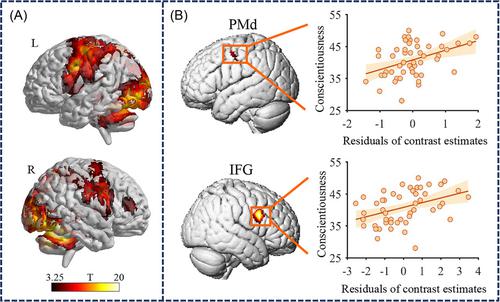当前位置:
X-MOL 学术
›
Ann. N. Y. Acad. Sci.
›
论文详情
Our official English website, www.x-mol.net, welcomes your feedback! (Note: you will need to create a separate account there.)
Personality traits modulate the neural responses to handwriting processing
Annals of the New York Academy of Sciences ( IF 5.2 ) Pub Date : 2022-07-27 , DOI: 10.1111/nyas.14871 Yang Yang 1, 2 , Junjun Li 1, 2 , Jun Zhang 3 , Ke Zhou 4 , Henry S R Kao 5 , Hong-Yan Bi 1, 2 , Min Xu 6
Annals of the New York Academy of Sciences ( IF 5.2 ) Pub Date : 2022-07-27 , DOI: 10.1111/nyas.14871 Yang Yang 1, 2 , Junjun Li 1, 2 , Jun Zhang 3 , Ke Zhou 4 , Henry S R Kao 5 , Hong-Yan Bi 1, 2 , Min Xu 6
Affiliation

|
Handwriting is a vital skill for everyday human activities. It has a wealth of information about writers’ characteristics and can hint toward underlying neurological conditions, such as Parkinson's disease, autism, dyslexia, and attention-deficit/hyperactivity disorder (ADHD). Many previous studies have reported a link between personality and individual differences in handwriting, but the evidence for the relationship tends to be anecdotal in nature. Using functional magnetic resonance imaging (fMRI), we examined whether the association between personality traits and handwriting was instantiated at the neural level. Results showed that the personality trait of conscientiousness modulated brain activation in the left premotor cortex and right inferior/middle frontal gyrus, which may reflect the impact of personality on orthography-to-grapheme transformation and executive control involved in handwriting. Such correlations were not observed in symbol-drawing or word-reading tasks, suggesting the specificity of the link between conscientiousness and handwriting in these regions. Moreover, using a connectome-based predictive modeling approach, we found that individuals’ conscientiousness scores could be predicted based on handwriting-related functional brain networks, suggesting that the influence of personality on handwriting may occur within a broader network. Our findings provide neural evidence for the link between personality and handwriting processing, extending our understanding of the nature of individual differences in handwriting.
中文翻译:

人格特质调节手写处理的神经反应
手写是人类日常活动的一项重要技能。它包含有关作家特征的大量信息,并可以暗示潜在的神经系统疾病,例如帕金森病、自闭症、阅读障碍和注意力缺陷/多动障碍 (ADHD)。许多先前的研究报告了个性与笔迹的个体差异之间的联系,但这种关系的证据在本质上往往是轶事。使用功能磁共振成像 (fMRI),我们检查了人格特质和笔迹之间的关联是否在神经水平上被实例化。结果表明,责任心的人格特质调节了左前运动皮层和右下/中额回的大脑激活,这可能反映了个性对笔迹中正字法到字素转换和执行控制的影响。在符号绘制或文字阅读任务中没有观察到这种相关性,这表明这些地区的尽责性和笔迹之间的联系具有特殊性。此外,使用基于连接组的预测建模方法,我们发现可以根据与手写相关的功能性大脑网络预测个人的责任心得分,这表明个性对手写的影响可能发生在更广泛的网络中。我们的研究结果为人格与笔迹处理之间的联系提供了神经证据,扩展了我们对笔迹个体差异性质的理解。在符号绘制或文字阅读任务中没有观察到这种相关性,这表明这些地区的尽责性和笔迹之间的联系具有特殊性。此外,使用基于连接组的预测建模方法,我们发现可以根据与手写相关的功能性大脑网络预测个人的责任心得分,这表明个性对手写的影响可能发生在更广泛的网络中。我们的研究结果为人格与笔迹处理之间的联系提供了神经证据,扩展了我们对笔迹个体差异性质的理解。在符号绘制或文字阅读任务中没有观察到这种相关性,这表明这些地区的尽责性和笔迹之间的联系具有特殊性。此外,使用基于连接组的预测建模方法,我们发现可以根据与手写相关的功能性大脑网络预测个人的责任心得分,这表明个性对手写的影响可能发生在更广泛的网络中。我们的研究结果为人格与笔迹处理之间的联系提供了神经证据,扩展了我们对笔迹个体差异性质的理解。使用基于连接组的预测建模方法,我们发现可以根据与手写相关的功能性大脑网络预测个人的责任心得分,这表明个性对手写的影响可能发生在更广泛的网络中。我们的研究结果为人格与笔迹处理之间的联系提供了神经证据,扩展了我们对笔迹个体差异性质的理解。使用基于连接组的预测建模方法,我们发现可以根据与手写相关的功能性大脑网络预测个人的责任心得分,这表明个性对手写的影响可能发生在更广泛的网络中。我们的研究结果为人格与笔迹处理之间的联系提供了神经证据,扩展了我们对笔迹个体差异性质的理解。
更新日期:2022-07-27
中文翻译:

人格特质调节手写处理的神经反应
手写是人类日常活动的一项重要技能。它包含有关作家特征的大量信息,并可以暗示潜在的神经系统疾病,例如帕金森病、自闭症、阅读障碍和注意力缺陷/多动障碍 (ADHD)。许多先前的研究报告了个性与笔迹的个体差异之间的联系,但这种关系的证据在本质上往往是轶事。使用功能磁共振成像 (fMRI),我们检查了人格特质和笔迹之间的关联是否在神经水平上被实例化。结果表明,责任心的人格特质调节了左前运动皮层和右下/中额回的大脑激活,这可能反映了个性对笔迹中正字法到字素转换和执行控制的影响。在符号绘制或文字阅读任务中没有观察到这种相关性,这表明这些地区的尽责性和笔迹之间的联系具有特殊性。此外,使用基于连接组的预测建模方法,我们发现可以根据与手写相关的功能性大脑网络预测个人的责任心得分,这表明个性对手写的影响可能发生在更广泛的网络中。我们的研究结果为人格与笔迹处理之间的联系提供了神经证据,扩展了我们对笔迹个体差异性质的理解。在符号绘制或文字阅读任务中没有观察到这种相关性,这表明这些地区的尽责性和笔迹之间的联系具有特殊性。此外,使用基于连接组的预测建模方法,我们发现可以根据与手写相关的功能性大脑网络预测个人的责任心得分,这表明个性对手写的影响可能发生在更广泛的网络中。我们的研究结果为人格与笔迹处理之间的联系提供了神经证据,扩展了我们对笔迹个体差异性质的理解。在符号绘制或文字阅读任务中没有观察到这种相关性,这表明这些地区的尽责性和笔迹之间的联系具有特殊性。此外,使用基于连接组的预测建模方法,我们发现可以根据与手写相关的功能性大脑网络预测个人的责任心得分,这表明个性对手写的影响可能发生在更广泛的网络中。我们的研究结果为人格与笔迹处理之间的联系提供了神经证据,扩展了我们对笔迹个体差异性质的理解。使用基于连接组的预测建模方法,我们发现可以根据与手写相关的功能性大脑网络预测个人的责任心得分,这表明个性对手写的影响可能发生在更广泛的网络中。我们的研究结果为人格与笔迹处理之间的联系提供了神经证据,扩展了我们对笔迹个体差异性质的理解。使用基于连接组的预测建模方法,我们发现可以根据与手写相关的功能性大脑网络预测个人的责任心得分,这表明个性对手写的影响可能发生在更广泛的网络中。我们的研究结果为人格与笔迹处理之间的联系提供了神经证据,扩展了我们对笔迹个体差异性质的理解。



























 京公网安备 11010802027423号
京公网安备 11010802027423号